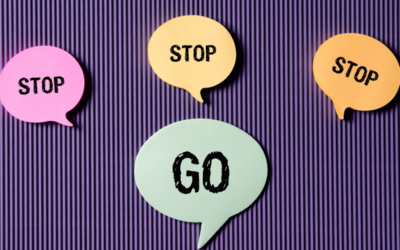Your day wasn’t exactly going smoothly, but you thought you had it handled. Yet somewhere between loud construction rousing you out of bed early, a particularly crowded subway ride into the office and an unexpected meeting on your work calendar, your nerves are feeling frazzled, you’re longing to cancel your happy hour date and even the thought of going into the grocery store to pick up oat milk feels like an impossible task.
Everything suddenly feels too loud, too bright, too fast and too heated. You notice your muscles tensing, your heart beating faster in your chest and your mind racing. The familiar feelings of confusion and overwhelm are creeping in and you’re not sure you could string a coherent sentence together if you tried.
Welcome to the world of overstimulation.
What is overstimulation?
Overstimulation happens when our nervous system has reached its capacity for taking in sensory input from the environment and we’re catapulted into a fight/flight/freeze response. The trait of high sensitivity, along with other forms of neurodivergence such as Autism and ADHD, make you more prone to getting overwhelmed by the sensory data the world is constantly throwing your way.
Your body is just trying to protect you.
When the part of your brain responsible for keeping you safe from danger (hi there amygdala!) senses that you are reaching, at, or over capacity, it does what it does best: prepares you to run the hell away, fight back or go into shutdown/freeze mode.
This is all well and good when there’s something tangible to run from, but what is a sensitive soul to do when suddenly the whole world feels like a threat?
The good news is that even naming what’s happening, and knowing that it’s to be expected – given your particular wiring, genetics and the frenetic and frantic pace of a world built on oppressive systems – can help. There is absolutely nothing wrong with you. Overstimulation is a fact of life for any neurodivergent person living in the hustle and bustle of such a fast-paced and on-all-the-time world.
Another piece of good news is that there are many practices that can help both ward off and recover from overstimulation. Here is a non-exhaustive list of some of those things:
Center and Ground
There are a lot of centering and grounding practices out there to help you regain a sense of control and coherence. One of my favorites is to take off my shoes and press my feet strongly into the ground beneath me. This can be done standing or sitting, and it can be helpful to play around with leaning left, right, front and back before finding what feels like center, where all four corners of your feet are firmly planted on the ground.
Depending on the level of overstimulation, it also might feel nice to come fully to the ground, either on your back or in a prone position, feeling the full support of gravity and the holding of the earth beneath you.

Weighted Blanket Burrito
Speaking of lying down on the ground, if you want to add a little extra gravity to this experience, a weighted blanket can feel delightful. I like to take my weighted blanket and wrap myself up like a burrito, tucking it tight around the sides of my body and my feet.
You can also find weighted stuffed animals which can bring an additional level of comfort and cuteness to this calming practice.
Spend Time with an animal(s)
Better yet, find a living and breathing animal to connect with. Animals can be deeply soothing to the nervous system, and they are also great role models for what to do with the experience of stress, overwhelm and overstimulation.
Connect with Nature
Going out into the natural world can also have a calming and grounding impact on the nervous system. If you can’t get outside, you might play around with visualizing a peaceful, natural environment that conjures up feelings of spaciousness and ease.
Oceanic Breathing
Your breath is always happening, and can be a great anchor for connecting to one thing happening in the present moment. One of my favorite breathing techniques comes from the practice of yoga and is called Ujayi breath, or “oceanic” breathing, as it mimics the sound of ocean waves ebbing and flowing.
I go into more detail about it in this post and you can click here for a demonstration.
Tune In
Music is a powerful tool for bringing our mind and body back into a state of regulation. The elements of rhythm, melody, repetition and the container of a familiar song can work wonders on the nervous system.
Cue up your favorite playlist or grab your guitar and strum some chords while you hum along (bonus: humming is great for stimulating the vagus nerve – the longest nerve in your body that helps activate the parasympathetic (rest and digest) nervous system).
Get Quiet
Making sure you have some form of quiet sanctuary is so important for HSPs and other neurodivergent folks. I am also a huge proponent of devices that help us turn down the noise of the outside world – earplugs, sleep masks and white noise all day (or night).
This is clearly a non-exhaustive list, and I’d love to hear what works for you when it comes to handling the reality of overstimulation.
If you’re looking to go deeper into understanding and harnessing the strengths and superpowers of your neurodivergence, schedule a free consultation with me here.




0 Comments